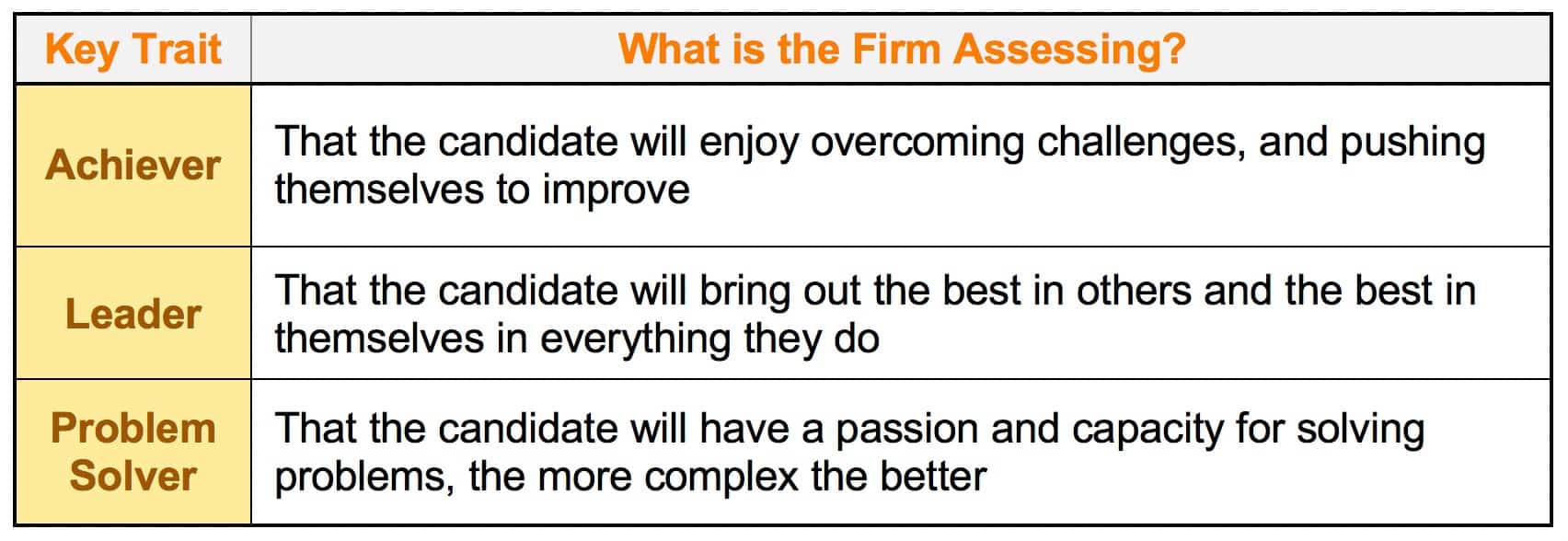Overview
This is the most challenging part of the journey. Let’s take it really seriously. First, I would say congratulations if you have made it to this step. It is an extraordinary achievement already. Now, to move forward, you have to understand and prepare extremely well for the interviews.
This article will give you a helicopter view of the interview process, and then dive into one part of it. I will continue this topic in my next article, which will consider the fine details of all you need to know.
Starting with the high-level view. The structure of the interview process is surprisingly similar across firms. As a candidate at this stage, you can expect two types of interview. One is called the ‘Fit Interview’. The other is notoriously known as the ‘Case Interview’. So, in one phrase, what are the characteristics of these two types of interview?
Fit Interviews are all about showing your compatibility with a firm’s working environment and culture.
Case Interviews are all about showing your problem-solving skills in a real business context.
The content of these interviews will bear little resemblance to any other interviews in any other role or industry.
The Fit Interview will include deceptively simple questions such as:
- “Why did you choose consulting?”
- “Why did you choose our firm?”, or
- “What achievement are you most proud of?”
These questions sound straightforward but keep in mind that the interviewer’s goal in asking these questions is to decide whether you will enjoy the work, the people, and the pace of career progression within the firm.
In contrast, the Case Interview will put you in the position of a real consultant. You will run through a real business case, such as “how can we increase the top line for a toy manufacting company in Thailand?” Or perhaps an extremely strange question like, “what is the rough number of smart phones sold in Hong Kong last year?”. The case interviewer will act like a client, waiting for you to probe for information, and for you to tell him or her your solution to the problem. You can expect questions about any aspects of a business. In short, the Case Interview process in management consulting firms is designed to measure your real capability and potential to be a consultant from day one.
Alright, I hope I have not scared you too much. Though management consulting interviews are extremely competitive, there is definitely something you can do to prepare.
Today, let’s start with the Fit Interview.
Fit Interview
Breaking down the Fit Interview, there are two sub-categories. One is the behavioural interview, and the other is the situational interview.
The behavioural part of the Fit Interview is designed to understand your knowledge and motivation for both the role and the firm. You could be given questions like:
- “Why you are interested in consulting?”
- “Why are you interested in our firm?”
- “Walk me through your resume.”
The situational part of the Fit Interview is designed to see how you think and behave in different situations based on your past experiences. You could get questions such as:
- “Tell me about a time when you demonstrated strategic thinking to lead your organization or project.”
- “What is the most unforgettable failure in your career experience and how did you handle it?”
- “Tell me about a time when you demonstrated leadership.”
- “Describe a time when you made a substantial impact to the outcome of a team project.”
- “Tell me about a time when you were on a team and had to persuade them of your point of view.”
Knowing the two categories of fit interview questions, you should also remember what management consulting firms are looking for: your ability to be a consultant.
Consultants always always and always approach tasks with clear structure and logic. Needless to say, you will need to structure your answers. Although I cannot walk you through all the possible answers to all Fit Interview questions, I do want to guide you through setting up a structure. Recall what I have mentioned many times, management consulting firms are assessing candidates for their Leadership, Achievement, and Problem Solving skills. So first you need to be clear how to demonstrate these qualities in a Fit Interview.
To make thing easier, I have drawn a table below so that you can see how you will be assessed and what you need to demonstrate.
With that in mind, your answer to a behavioural question could follow a simple structure: Framing, Support and Wrap-up. Framing is to set up the answer that you are about to give. Support is to provide details and evidence to each of the points mentioned in the Framing, such as a small event or experience in your life or career. Wrap-up is to repeat the most important part of your answer in another way. To remember this structure more easily, you can just take is as Tell you what I am going to say -> Say it -> Repeat what I have said.
To answer a situational question, the STAR structure can be used. STAR stands for Situation-Task-Action-Results. With this structure, you start by describing the big picture. Then specify the task YOU were responsible for. Describe the actions YOU took and explain why you took those actions. Finally, articulate the results and what you learned from the situation.
To be very honest, even reading a hundred articles about how to answer Fit Interview questions will not assure your success in the interview. The magic formula is that practise makes perfect. So, start by finding a peer who is also on the journey to become a management consultant and practise with him or her. Find a real consultant and try to ask for a mock interview. One caveat is that you need to do your homework before meeting to practise. No one wants to waste time explaining the format of the interview and why the Fit Interview is important. And you should start even before you submit the application since your interview skills definitely cannot be built overnight.
OK, next time, let’s crack the secret of the Case interview.
Stay tuned!
Free Download: This guidebook distils all of Mike’s insights on how to achieve success in your journey towards a career in management consulting: download now!
Mike Ni believes that technology is the engine of the future, while business capability is the wheel!
Image: Pexels

